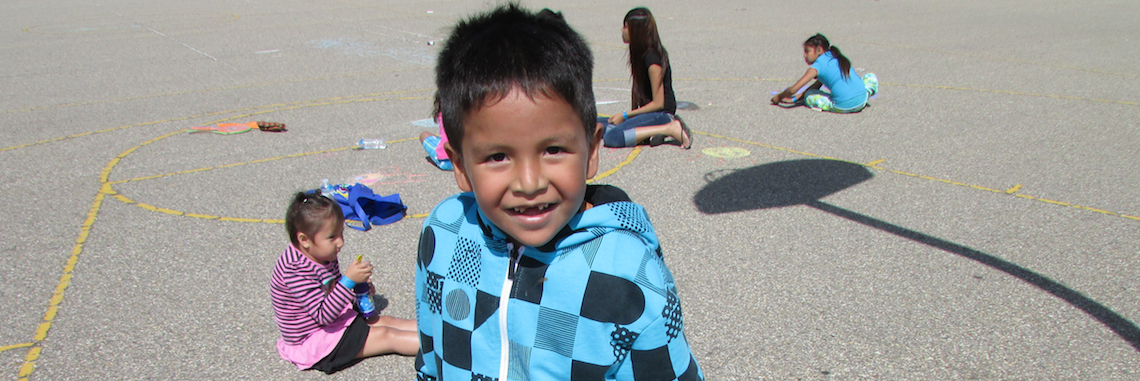Speaking up for the rights of Indigenous children
Every child deserves a chance to grow up healthy, learning and safe. Yet around the world millions of children are being left behind because of who they are or where they’re born. Too often these children are Indigenous.
In 90 countries around the world there are an estimated 370 million Indigenous Peoples[1]. In many of these countries, Indigenous Peoples have been systematically denied their rights to their traditions, spirituality, medicines, their land, and their language. Too many Indigenous peoples have experienced colonization, the dispossession of land, and the targeted assimilation of women and children.
Many countries also practiced forced assimilation policies, which included the brutal and violent removal of children from families and communities. These children were then made to attend schools designed specifically to strip away their Indigenous culture, language, and worldviews. Despite these practices stopping, the damage from these actions lingers.
Today, the spiritual and economic relationship between Indigenous Peoples and their traditional lands have in many cases been severed. This has led to systemic poverty, and suffering. Indigenous Peoples currently make up only 5% of the world’s population, but 15% of the world’s poorest. This means that globally, Indigenous children are vulnerable, excluded, and left behind.
This problem is exemplified time and time again, in too many different countries. Indigenous children represent 7% of all children in Canada,[2] but the poverty rate among Indigenous children is 40%, compared with the national average of 17%. In Peru, Indigenous Quechua children are 1.6 times more likely to die before their fifth birthday and more than twice as likely to be stunted as their non-Indigenous peers. Australia is typically ranked near the top of global comparisons of education attainment.[3] However, Aboriginal and Torres Strait Islander children are more than twice as likely to be developmentally vulnerable than non-Indigenous children[4] and there has been no overall improvement in reading and numeracy among Aboriginal and Torres Strait Islander children since 2008.[5]
Save the Children, as part of our global Every Last Child campaign is this year attending the United Nations Permanent Forum on Indigenous Issues for the first time. While several of our members and country offices have ongoing work with Indigenous children, Save the Children has yet to develop a global position on the experiences of Indigenous Peoples. While Indigenous Peoples speak of their experiences through the lens of racial discrimination, they also speak of their experiences from a rights point of view – they have experienced grave violations of their individual rights but also of their collective rights, and their rights to the land. These rights are indivisible. And, as a rights-based organization, it is imperative for us to support Indigenous Peoples.
For Save the Children to effectively work with Indigenous communities we must try something new and different. We must live the spirit of partnership in a way that we may never have before. We must partner with Indigenous Peoples to collaboratively define and learn how we can be allies to Indigenous children and communities, and support their efforts to build capacity and self-determination. Save the Children in Canada has learned that this while this can make the journey both slower and more challenging, it yields results that are ultimately much more meaningful and rewarding for everyone involved.

Save the Children can and should speak to the rights of Indigenous children the way our Every Last Child campaign speaks to the rights of all children – every child has a right to the essential basic quality services that will make them healthy, educated and protected. But on top of that I believe Save the Children has an additional responsibility when speaking to the rights and needs of Indigenous children; their rights to their language, their culture, their spirituality and their traditional territories must be defended and protected with passion.
When I arrived in Canada as Save the Children’s President and CEO, a Truth and Reconciliation process had just begun. I know from my own experiences with a parallel process in Argentina that this can be a painful and long journey. The Government and Canadians are starting to realize the decades of work that will be required for true Reconciliation to take place. Save the Children Canada hopes to play a role in this process through partnering with Indigenous organizations, listening to Indigenous children and communities, ceding space for Indigenous leadership and learning what it means to be an ally-organization.
I’ve always been inspired by the words and writing of our founder, Eglantyne Jebb. I feel her beliefs are reflected in the many Indigenous teachings around the world that remind us that all our decisions as adults will have implications for the future generations of children. The teachings also remind us that the Spirit of each Child comes into this world with everything that they will need to fulfill their purpose. Our job and shared responsibility is to ensure we support that child as they realize their dreams.
[1] http://www.un.org/esa/socdev/unpfii/documents/2016/Docs-updates/Backgrounder_Indigenous_Day_2016.pdf
[2] Aboriginal Peoples in Canada in 2006: Inuit Métis and First Nations, 2006 Census
[3] Footnote 25 Every Last Child (ELC) report
[4] Footnote 26 ELC report
[5] Footnote 27 ELC report


